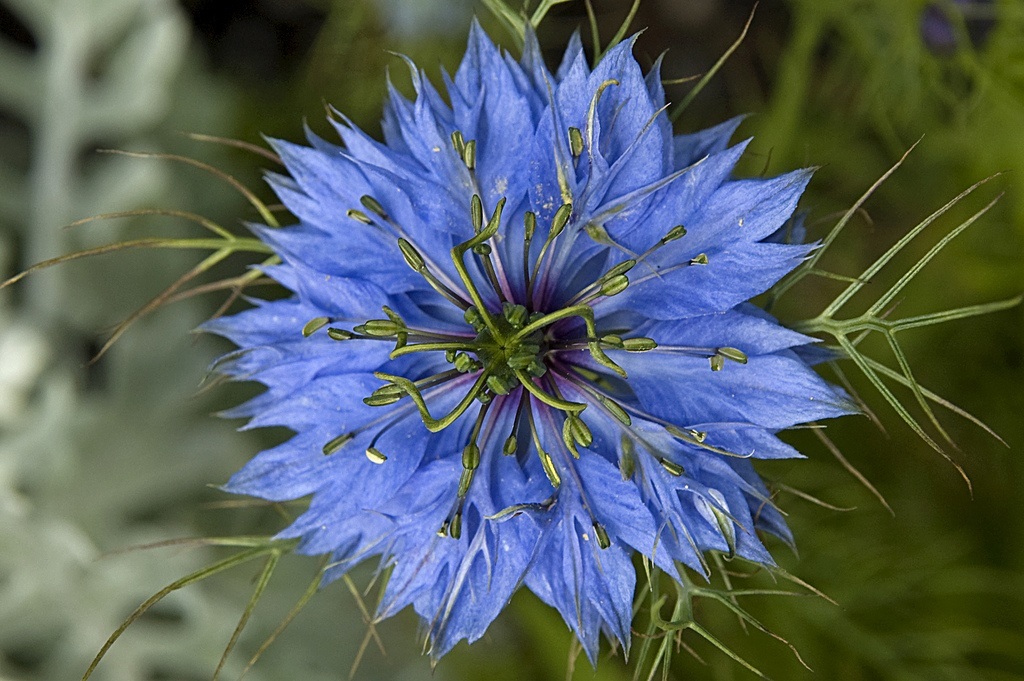
Nigella sativa is an annual flowering plant in the family Ranunculaceae, native to south and southwest Asia. The flowers are delicate, and usually coloured pale blue and white, with five to ten petals. The fruit is a large and inflated capsule composed of three to seven united follicles, each containing numerous seeds which are used as spice, sometimes as a replacement for original black cumin Bunium bulbocastanum.
Nigella sativa seed has various names: kalonji, fennel flower, nutmeg flower, black caraway, and Roman coriander. Blackseed and black caraway may also refer to Bunium persicum.Other names used, sometimes misleadingly, are black cumin, onion seed and black sesame. Synonymously, it may be referred to as thymoquinone after its principal extract under preliminary research for several possible effects in humans.
In India Nigella is used as part of the spice mixture paanch phoran or panch phoron (meaning a mixture of five spices) and by itself in many recipes in Bengali cuisine and most recognizably inPeshawari naan – as a rule, topped with kalunji seeds.
Some facts from History
The earliest record of its cultivation and use come from ancient Egypt. Black seed oil, in fact, was found in Egyptian pharoah Tutankhamun’s tomb, dating back to approximately 3,300 years ago.It is unknown, it is known that items entombed with a pharaoh were carefully selected to assist him in the afterlife. In Arabic cultures, black cumin is known as Habbatul barakah, meaning the “seed of blessing.” It is also believed that the Islamic prophet Mohammed said of it that it is “a remedy for all diseases except death.” According to Zohary and Hopf, N. sativa was another traditional condiment of the Old World during classical times, and its black seeds were extensively used to flavor food. Seeds were found in a Hittite flask in Turkey from the second millennium BCE.
Preliminary human Research
Mainly for its seed oil extract, thymoquinone, Nigella is under research for its potential to affect human diseases, such as cancer or metabolic syndrome. Many of black cumin’s traditionally ascribed health benefits have been thoroughly confirmed in the biomedical literature. In fact, since 1964, there have been 458 published, peer-reviewed studies referencing it. These 22 pharmacological actions are only a subset of a far wider number of beneficial properties intrinsic to the black seed. While it is remarkable that this seed has the ability to positively modulate so many different biological pathways, this is actually a rather common occurrence among traditional plant medicines.
Health project has identified over 1600 natural compounds with a wide range of health benefits, and we are only in our first 5 years of casual indexing. There are tens of thousands of other substances that have already been researched, with hundreds of thousands of studies supporting their medicinal value (MEDLINE, whence our study abstracts come, has over 600,000 studies classified as related to Complementary and Alternative Medicine).
Take turmeric, for example. We have identified research indicating its value in over 600 health conditions, while also expressing over 160 different potentially beneficial pharmacological actions. This, of course, should help folks realize how voluminous the supportive literature indicating the medicinal value of natural substances, such as turmeric and black seed really is.
Medicinal Properties
The seeds of Kalunji have been prized for their healing properties since time immemorial. This humble, but immensely powerful seed, kills MRSA, heals the chemical weapon poisoned body, stimulates regeneration of the dying beta cells within the diabetic’s pancreas, and yet too few even know it exists. Black seed has been researched for very specific health conditions. Some of the most compelling applications include:
- Type 2 Diabetes: Two grams of black seed a day resulted in reduced fasting glucose, decreased insulin resistance, increased beta-cell function, and reduced glycosylated hemoglobin (HbA1c) in human subjects.
- Helicobacter Pylori Infection: Black seeds possess clinically useful anti-H. pylori activity, comparable to triple eradication therapy.
- Epilepsy: Black seeds were traditionally known to have anticonvulsive properties. A 2007 study with epileptic children, whose condition was refractory to conventional drug treatment, found that a water extract significantly reduced seizure activity.
- High Blood pressure: The daily use of 100 and 200 mg of black seed extract, twice daily, for 2 months, was found to have a blood pressure-lowering effect in patients with mild hypertension.[v]
- Asthma: Thymoquinone, one of the main active constituents within Nigella sativa is superior to the drug fluticasone in an animal model of asthma. Another study, this time in human subjects, found that boiled water extracts of black seed have relatively potent antiasthmatic effect on asthmatic airways.
- Protection Against Heart Attack Damage –An extract from black seed has been shown to possess heart-protective qualities, dampening damages associated with heart attacks and boosting overall heart health.
- Acute tonsillopharyngitis: characterized by tonsil or pharyngeal inflammation (i.e. sore throat), mostly viral in origin, black seed capsules (in combination with Phyllanthus niruri) have been found to significantly alleviate throat pain, and reduce the need for pain-killers, in human subjects.
- Chemical Weapons Injury: A randomized, placebo-controlled human study of chemical weapons injured patients found that boiled water extracts of black seed reduced respiratory symptoms, chest wheezing, and pulmonary function test values, as well as reduced the need for drug treatment.
- Colon Cancer: Cell studies have found that black seed extract compares favorably to the chemoagent 5-fluoruracil in the suppression of colon cancer growth, but with a far higher safety profile. Animal research has found that black seed oil has significant inhibitory effects against colon cancer in rats, without observable side effects.
- Breast Cancer –A few studies have linked a thymoquinone extract from nigella sativa to reduced breast cancer tumor growth and increased apoptosis (cell death) in breast cancer cells.
- Brain Cancer –A study published in the online journal PLoS One indicates thymoquinone from black seed can induce cell death in glioblastoma cells. Glioblastoma is one of the most aggressive brain tumors of all.
- Oral Cancer – Research indicates thymoquinone from nigella sativa is able to induce cell apoptosis in oral cancer cells.
- Leukemia –As it’s been shown to do with other types of cancer, black seed compound thymoquinone has also been shown to induce apoptosis in leukemia cells.
- MRSA: Black seed has anti-bacterial activity against clinical isolates of methicillin resistant Staphylococcus aureus.
- Opiate Addiction/Withdrawal: A study on 35 opiate addicts found black seed as an effective therapy in long-term treatment of opioid dependence.
- Brain Damage from Lead –A study published in Experimental and Toxicologic Pathology indicates black seed is able to dampen and reverse damage to the brain sparked by lead toxicity.
READ THE BEST WAYS TO CONSUME NIGELLA SATIVA TOMORROW!


























